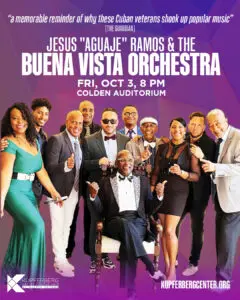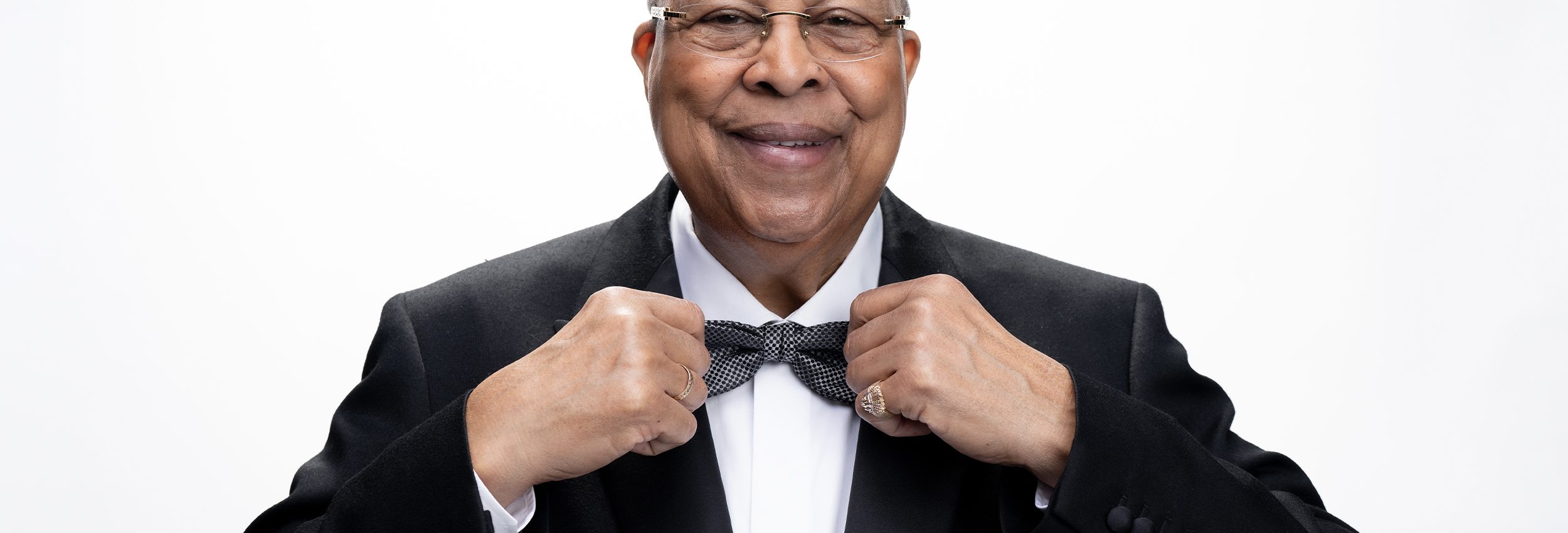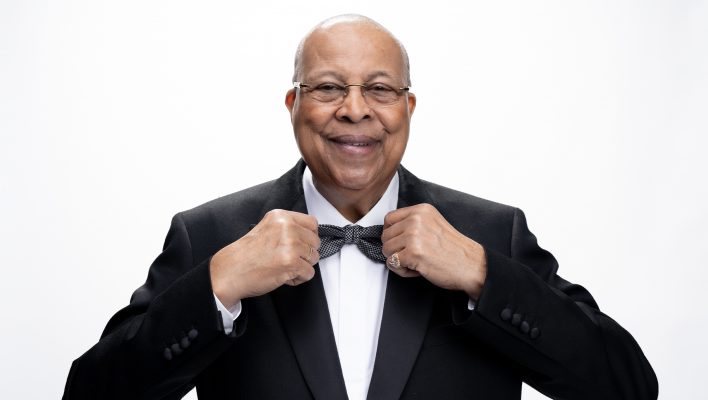We’d love to see your moments! Share your experience on Instagram & tag us @kupferbergcenter!
SUN, MAY 4, 2025, 3 PM at COLDEN AUDITORIUM
We’re thrilled to present a true legend of Latin jazz: Chucho Valdés, winner of seven Grammy Awards, six Latin Grammy Awards, and honored as an NEA Jazz Master. A towering figure in modern Afro-Cuban jazz, Chucho has spent more than sixty years redefining and expanding the boundaries of the genre.
Tonight’s concert, Chucho Valdés: Irakere 50, is a powerful celebration of his groundbreaking Cuban band Irakere, which revolutionized Latin jazz with its bold fusion of Afro-Cuban ritual music, popular Cuban styles, jazz, and rock. Widely recognized for changing the course of Cuban music, Irakere’s legacy continues to resonate around the world.
This special performance features a new generation of talent, including guest vocalist Emilio Frías, and invites audiences to experience the vibrant energy, innovation, and passion that define Chucho Valdés’s enduring artistry.
We’re honored to share this incredible night of music with you—enjoy the show!
ABOUT THE ARTISTS
Chucho Valdés (piano)
José A Gola (bass)
Horacio “El Negro” Hernández (drums)
Roberto Jr. Vizcaíno Torre (percussion)
Eddie de Armas Jr. (trumpet)
Osvaldo Fleites (trumpet)
Luis Beltrán (saxophone)
Carlos Averhoff Jr. (saxophone)
& Special guest vocalist Emilio Frias
CHUCHO VALDÉS
Cuban pianist, composer, and arranger Chucho Valdés is the most influential figure in modern Afro-Cuban jazz. Over a career spanning more than 60 years as a musician and bandleader, Valdés has distilled elements of Afro-Cuban musical tradition, jazz, classical, and rock into a deeply personal style.
Winner of seven GRAMMY® and six Latin GRAMMY® awards, Mr. Valdés received the Lifetime Achievement Award from the Latin Academy of Recording Arts and Sciences. He has been also inducted into the Latin Songwriters Hall of Fame. Mr. Valdés most recent awards include a Latin GRAMMY in 2023 for Yo También te Eché de Menos, the product of his reunion with longtime friend and musical partner, clarinetist, saxophonist, and composer Paquito D’Rivera, and a GRAMMY and Latin GRAMMY in 2022 for Mirror Mirror, an album of duets with pianist and singer Eliane Elias and the late great pianist and composer Chick Corea.
Mr. Valdés maintains a remarkable activity on stage, performing as a soloist and leader of groups in different configurations, including his quartet and orchestral ensembles.
In 2024, Mr. Valdés led Irakere 50, a celebration of the small big band he founded in 1973 and led until 2005. With its bold fusion of Afro-Cuban ritual music, Cuban popular music, jazz, rock, and elements of classical music, Irakere marked a before and after in Latin jazz. In 1979, Irakere was the first Cuban band to receive a GRAMMY, winning the award for their eponymous debut album in the United States. In a historic concert at the Arsht Center in Miami, part of the Irakere 50 tour, Mr. Valdés summoned two pillars of that band who are stars in their own right: D’Rivera and trumpeter and composer Arturo Sandoval.
But while celebrating achievements, Mr. Valdés has continued to look ahead with works such as “La Creacion,” a three-movement suite for small ensemble, voices, and big band, which tells the story of the origin of the world according to the Regla de Ocha, the Afro-Cuban religion most commonly known as Santeria.
“La Creación” premiered on November 5, 2021, at the Adrienne Arsht Center in Miami.
Dionisio Jesús “Chucho” Valdés Rodríguez was born in Quivicán, Havana province, Cuba, on October 9, 1941. His first musical teacher was his father, the great pianist, composer, and bandleader Ramón “Bebo” Valdés, a legendary figure in Cuban music. From those lessons at home, his formal studies, and his experiences on stages in concert halls and jazz clubs, Mr. Valdés developed a style that marked an era in Afro-Cuban jazz.
Chucho Valdés Reflects on the Origin and Influence of Irakere’s Afro-Cuban Jazz
by Judy Cantor-Navas
“The idea for Irakere didn’t have a name or a specific concept,” Chucho Valdés told me in 2021, during of the many conversations we’ve had over the years that for me have amounted to a master class on Cuban music. “What we did was break through barriers, we explored all different kinds of music, and that’s how we broke with everything that came before us.
“It’s often said that there is a before and after Irakere in Cuba,” he added. “And then we took our music to the world.”
This Thursday – May 8 – Chucho brings Irakere 50, his celebration of his groundbreaking band Irakere, which in the ’70s changed the sound of Cuban music, and also made history by winning a Grammy award, to NYC. The Irakere 50th anniversary celebration has extended from 2023 until now; on Thursday the concert takes place at the Kupferberg Center for the Arts in Queens. This weekend, there are shows in Blacksburg, VA and North Bethesda, MD; and in July at Chicago’s Ravinia festival. If you’re in the mood to be blown away, go.
The 83-year-old pianist, current elder of a musical family dynasty and godfather of contemporary Cuban music, was celebrated this year as one of the NEA Jazz Masters. He remains, as always, both a fearless vanguard and musical preservationist.
The most exciting and virtuoso Cuban musicians from younger generations in the diaspora play with him in both the Irakere project and his latest band, the Royal Quartet, with which he is also touring through July. (Read down for details).
Thursday’s concert at the Kupferberg Center will feature Emilio Frías of the popular Cuban group El Niño y el Verdad as guest vocalist. Chucho’s teenage son, Julían Valdés, is touring with the Irakere band on percussion.
Last summer, when Chucho presented Irakere 50 at Barcelona’s Festival Cruilla, I had a chance to talk with him about the groundbreaking group’s beginnings, influence and revival.
When you founded Irakere in 1973, was your intention to create a new form of jazz in synch with the times? Did you set out to break barriers?
Jazz in Cuba always had an audience. But we didn’t just want to play for the jazz fans, we wanted to widen that audience and mix Cuban dance music with jazz. We would do shows that were announced as jazz concerts, but as some of our dance numbers, like “Por romper el coco,” started getting popular, and people came to dance. People went to our shows wherever they were, and soon we were playing for a crowd of 5000.
We had a different sound and tremendous musicians: Paquito de Rivera, Arturo Sandoval, Carlos Emilio, Oscar Valdés…and myself. We used Afro-Cuban rhythms mixed with jazz and other elements like rock or classical music and that was a revolution. From then on it was a new vision.
The harmony and the improvisation were pure jazz. But we accompanied that with something very Afro-Cuban. And classical music. We could do it as son, as jazz, as rock but the improvisation was always based on true jazz, the school of dizzy Gillespie. The seed was jazz. The one who started that was Mario Bauzá in the 1940s. Mario Bauzá, Dizzy Gillespie and Chano Pozo, who were the fathers of all of this. Without them what we did with Irakere would never have happened.
You were conservatory trained artists, in the early days you played everything from a version of The Beatles “Yesterday” to Afro-Cuban arrangements of classical music.
It was a way of showing that there is not just one kind of music. Of course, there are the two kinds, the good kind and the other, the bad. [laughs]. We’d play Mozart or we’d play Samuell, but with a funk arrangement. It was never purely classical, and that really worked with our audiences. And of course there was the Afro-Cuban music. We were using the tambores batá. We started working with the abakuá drumming. We performed “La misa negra” (“The Black Mass”), that I wrote, and people went wild.
Irakere won a 1980 Grammy award for Best Latin Recording, at a time when new Cuban bands were virtually unknown in the United States because of the trade embargo. Did you feel a responsibility to represent Cuba? Or was it totally about going to the land of jazz?
We were really focused on presenting our musical ideas. And more than anything we wanted to see how our music would be received. We didn’t know if our music would be accepted but it was an international success, and we went on to see how Afro-Cuban jazz took root all over the world. For us, meeting American jazz players like Dizzy, Stan Getz and Bill Evans was a dream come true.
In 1977, Dizzy saw the band in Havana, and when he got back to New York, he told Bruce Lundvall [then at CBS and the future president of Blue Note Records], “you have to see this band.” Bruce came to hear us play, and from there we were signed to CBS Records, we went to the Grammys, we played at Carnegie Hall and everything. Wow!
When you decided to put together the Irakere 50 concerts, why was it important to you to bring together younger musicians from different generations?
Irakere was a musical event 50 years ago, and it’s continued to be important for younger generations. The musicians [playing with me] are proud to be playing music that they were practically born with. The original arrangements of Irakere’s music are studied and performed at the music schools in Cuba, and beyond.
For me, it’s important to see how new generations bring their own experiences and point of view to the music. It’s really spectacular.
Your 18-year-old son Julián has also been part of the lineup at these concerts.
He’s my first child born in the 21st century. He’s joining us on percussion. He has an incredible talent. And I’m not just saying that because he’s my son [laughs].
Your Irakere bandmate, sax player Paquito de Rivera, has also been appearing at some of the concerts, and trumpeter Arturo Sandoval joined you at a concert in Miami, a historic event that will be repeated in July at a Irakere 50 show at the Ravinia Festival near Chicago. Did it feel like old times on the stage?
I think it was better.
ON SALE NOW: BUEVA VISTA ORCHESTRA (10/3/2025)

Step into the world of Cuban music legends with Jesus “Aguaje” Ramos and The Buena Vista Orchestra, as they take the stage for a night filled with rhythm, soul, and electrifying music. Featuring iconic members of The Buena Vista Social Club, this concert celebrates the rich legacy of Afro-Cuban music with a mix of timeless hits and deep cuts. From fiery trombone solos to soulful vocals, experience the energy and spirit of Cuban jazz that has captivated audiences worldwide. Don’t miss this rare opportunity to see the iconic orchestra live, as they continue their global tour in 2025.




